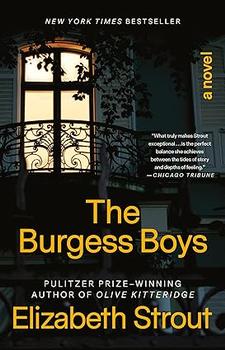Summary | Excerpt | Reading Guide | Reviews | Beyond the Book | Read-Alikes | Genres & Themes | Author Bio

This article relates to The Burgess Boys
Years ago, when we were vacationing in Maine, we drove through the city of Portland and I spotted a lady holding a child by the hand. She was dressed in an extremely colorful hijaab and that riot of color really stood out in my mind – I was reminded of that flash of color after I put down The Burgess Boys.
 The civil war that wracked Somalia for much of the early '90s meant an increasing number of refugees fleeing the country to distant places, including the United States. While large urban areas such as Atlanta attracted the first wave of Somalis, in the early 2000s, Somali immigrants started making their way into Maine, initially to Portland. Because the city of Portland had very limited affordable housing options, the Somalis moved north, to the city of Lewiston, the second largest city in Maine. The fictional town of Shirley Falls in The Burgess Boys might well be modeled after Lewiston.
The civil war that wracked Somalia for much of the early '90s meant an increasing number of refugees fleeing the country to distant places, including the United States. While large urban areas such as Atlanta attracted the first wave of Somalis, in the early 2000s, Somali immigrants started making their way into Maine, initially to Portland. Because the city of Portland had very limited affordable housing options, the Somalis moved north, to the city of Lewiston, the second largest city in Maine. The fictional town of Shirley Falls in The Burgess Boys might well be modeled after Lewiston.
A thriving mill town up until the '70s, by 2000 the city was in steep decline with an increasingly aging population that was 96% white. The Somalis started moving in at just the right time – with the population decline so high there was plenty of affordable housing. As a result of immigration, housing availability declined from 20% in 2001 to 7% percent by 2008.
A small percentage of the Somalis in Maine were settled there by refugee resettlement programs, but it's estimated that 95% of the 3500 Somalis living in Lewiston are secondary migrants - that is to say that they were previously settled in other parts of the USA but have chosen to move to a new location; and, of course, some now arrive via family reunification programs sponsored by relatives who have become U.S. citizens or permanent residents. It's not entirely clear why the Somalis chose a city that was economically depressed and not culturally diverse, but some have speculated that availability of housing, a relatively safe city and schools for their children might have been equally powerful draws. The city of Lewiston is appealing because of the possibility of parents being able to exert greater social control over their kids. And while crime in inner-city Lewiston is a presence, it is still less than inner-city Atlanta.
The Somali migration to Lewiston is not all homogeneous. The minority Somali Bantus, a group marginalized in their homeland, have moved here along with the rest. Even if Lewiston is no stranger to large-scale immigration (French Canadians have a strong presence here), the sudden influx of African foreigners into a primarily white city was not without its upheavals. Many complained that the Somalis were only there to soak up welfare benefits. The pig's head incident described in The Burgess Boys is modeled after a real incident that occurred in a Lewiston mosque.
More than ten years after the first Somalis started to arrive, it could be argued the city of Lewiston is enjoying a renewed burst of optimism. The mayor of Lewiston in 2010, Larry Gilbert, said: "I look at the apartment buildings that they're living in and I say, 'What if they weren't here? Those buildings would be empty and what would our tax revenue be?' So I really think they're adding to the economy. And I think that that's something that people just don't realize. They think that the system is being drained, when in fact, they're contributing to it."
The city's current mayor, Robert Macdonald, however, made headlines in 2012 when he commented in a BBC documentary that the new immigrants should "leave their culture at the door." The mayor has since clarified (if not apologized for) his comments.
This PBS segment beautifully captures the dynamics of the demographic shift (As of 2011, Somalis make up about ten percent of Lewiston's population).
Photo by Herb Swanson for The New York Times
Filed under Places, Cultures & Identities
![]() This "beyond the book article" relates to The Burgess Boys. It originally ran in April 2013 and has been updated for the
April 2014 paperback edition.
Go to magazine.
This "beyond the book article" relates to The Burgess Boys. It originally ran in April 2013 and has been updated for the
April 2014 paperback edition.
Go to magazine.
Your guide toexceptional books
BookBrowse seeks out and recommends the best in contemporary fiction and nonfiction—books that not only engage and entertain but also deepen our understanding of ourselves and the world around us.